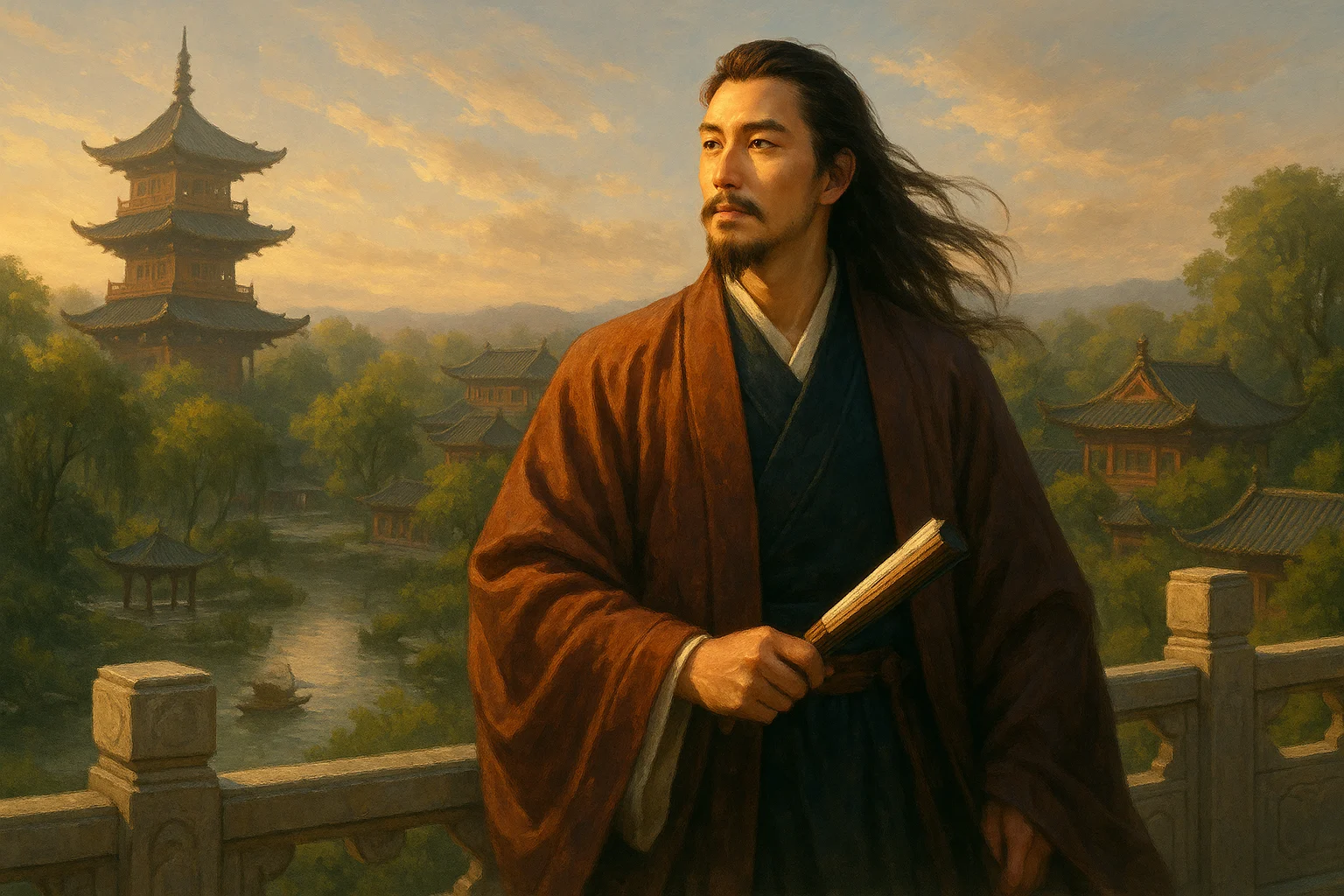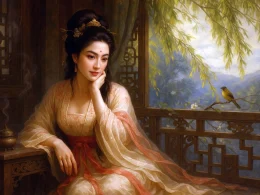The hills pour green to flood the pools,
Straight trenches curve to liquid jewels.
Counting petals makes time bloom—
Late return perfumes the gloom.
Original Poem
「北山」
王安石
北山输绿涨横池,直堑回塘滟滟时。
细数落花因坐久,缓寻芳草得归迟。
Interpretation
This poem was composed during Wang Anshi's later years after his retirement to Zhongshan, following his resignation as chancellor. Free from the tumult of political affairs, he immersed himself in nature, achieving a state of serene tranquility. This landscape quatrain exemplifies his late poetic style—elegant, understated, and imbued with personified natural imagery. Amidst the secluded beauty of Beishan's spring scenery, the poet's mind wanders freely, using mountains and waters as vessels for his contemplations on life, revealing profound insights through subtle details.
First Couplet: "北山输绿涨横池,直堑回塘滟滟时。"
Běi shān shū lǜ zhǎng héng chí, zhí qiàn huí táng yàn yàn shí.
Beishan pours its green into brimming ponds,
through straight moats and winding pools it shimmers.
This couplet, purely descriptive yet deeply emotive, animates the landscape through personification. "Pours its green" (输绿) transforms the static mountain into an active giver of vitality, saturating the scene with lushness. The rising water "shimmers" (滟滟) in sunlight, its undulating reflections tracing both straight and winding paths—a dynamic interplay of light and form. The imagery constructs a harmonious, expansive tableau where nature's generosity mirrors the poet's receptive state of mind.
Second Couplet: "细数落花因坐久,缓寻芳草得归迟。"
Xì shǔ luò huā yīn zuò jiǔ, huǎn xún fāng cǎo dé guī chí.
Counting fallen petals, I've sat too long;
lingering for fragrant grass, my return slows.
Transitioning from scenery to human action, this couplet captures the poet's unhurried communion with nature. "Counting fallen petals" (细数落花) arises from meditative stillness, transforming idle time into purposeful attention to ephemeral beauty. "Lingering for fragrant grass" (缓寻芳草) extends this absorption, where the deliberate pace of "lingering" and "slows" (得归迟) reflects spiritual rather than physical movement. The inverted causality ("sat too long" preceding "counting," "return slows" preceding "lingering") creates a rhythmic cadence that mirrors the poet's meandering mindfulness, embodying the unpressured rhythm of retired life.
Holistic Appreciation
A masterpiece among Wang Anshi's mountain retreat poems, this work unfolds against Beishan's spring backdrop, intertwining landscape and introspection. The first couplet vitalizes nature through personified imagery—the mountain "pouring" verdure, the water "shimmering"—constructing an animate, interconnected world. The second couplet reveals the poet's psychological landscape through mundane yet revelatory acts: counting petals and foraging for grass become meditative practices that externalize his inner tranquility.
What distinguishes this poem is its seamless fusion of scene and sentiment without explicit emotional declaration. The mountain's bestowed green and the poet's gathered petals form a silent dialogue between giver and receiver, between macrocosm and microcosm. The understated actions ("counting," "lingering") resonate with philosophical depth, reflecting a retiree's hard-won equanimity and his recalibration of attention to life's minutiae.
Structurally, the poem moves from broad natural spectacle to intimate human gesture, telescoping from mountain vistas to petal and grass blade. This progression mirrors the Confucian ideal of "investigating things to extend knowledge" (格物致知), where close observation of nature yields self-awareness. The parallel couplets—each line mirroring its counterpart in syntactic and thematic harmony—create a self-contained world as balanced and interwoven as the landscape it depicts.
Artistic Merits
- Personified natural imagery:
Verbs like "pours" (输) and "shimmers" (滟滟) animate the scenery, transforming passive elements into active participants in the poetic moment. - Emotion through action:
Subjective feelings emerge indirectly via concrete activities ("counting," "lingering"), exemplifying the Chinese aesthetic of "scene embodying emotion" (情景交融). - Inverted causality for rhythmic nuance:
The rearranged sequence of actions and their effects ("sat too long" before "counting") creates a meandering cadence that mimics the poet's unhurried mindset. - Precision in simplicity:
Minimalist diction ("petals," "grass") belies profound implications, where singular natural fragments encapsulate broader existential reflections.
Insights
This poem articulates an aesthetics of post-retirement life—finding wholeness not in grand achievements but in attentive coexistence with nature's ordinary wonders. Unlike conventional recluse poetry that emphasizes escape, Wang's verse celebrates re-engagement with the world at a different frequency: slower, closer, and more porous to beauty. His counting of petals is both a literal act and a metaphor for recalibrated values, where former political urgency gives way to measured appreciation of transient splendor.
The work suggests that true peace arises not from severing ties with the world but from redefining one's relationship to it. The mountain that "pours its green" symbolizes enduring generosity, while the poet's delayed return embodies willing surrender to nature's tempo. For contemporary readers, this poem offers a counterpoint to modern haste, advocating for a consciousness that treasures the insignificant and finds grandeur in granular attention. Wang's retreat becomes not withdrawal but a deeper, more deliberate form of presence.
About the Poet

Wang Anshi (王安石 1021 - 1086), a native of Linchuan in Jiangxi, was an outstanding statesman, writer, and thinker of the Northern Song Dynasty, counted among the "Eight Great Prose Masters of the Tang and Song Dynasties." His poetic achievements were particularly profound—his early works, filled with heroic language, revealed the ambition of a reformer. Though his ci poetry was few in number, it pioneered new realms of historical reflection. His poetry and prose combined intellectual depth with artistic value, and the over 1,500 works preserved in The Collected Works of Linchuan stand as a monumental testament to literary innovation in Song Dynasty literature.












